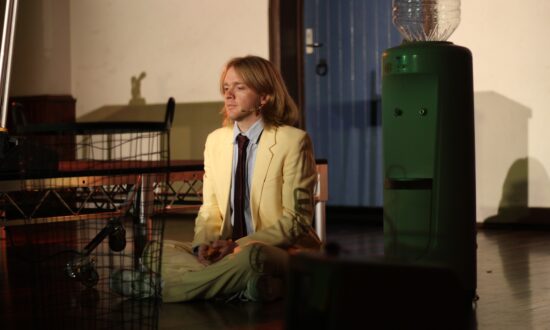Who would have thought mustard, the humble condiment, would prove to be such a powerful device in the expression of grief and in uncovering new ways of discussing pain?
Written and performed by Irish theatre maker Eva O’Connor, Mustard is the story of “E” as she unravels into madness – as her “mind goes to mustard” after the man she adores leaves her.
We meet E as she stands centre-stage, holding a shopping bag in each hand, under a light in a blackbox set. She’s in tracksuit pants, and a worn-out oversized sweatshirt, and her hair is swept up, messily, in a bun on top of her head. This is a familiar sight to anyone who has made their way through heartache.
O’Connor’s writing is intricate and intensely moving. Every line of this hour-long monologue is as important as the next. She not only captures heartbreak spectacularly but is also able to give language to the euphoria of new relationships. She speaks of the remarkable functionality we experience when a relationship is fresh, the thrill of learning someone, the sensation of being looked at with intrigue.

Get InReview in your inbox – free each Saturday. Local arts and culture – covered.
Thanks for signing up to the InReview newsletter.
Mustard, specifically English mustard, is another character in this story. Its effectiveness in helping O’Connor tell her story comes from its broadness as a symbol. It represents a coping mechanism, a mental illness, an addiction, a cry for help, a desperate attempt to feel something.
As a condiment, this symbolism makes sense: mustard is strong, has a bite to it, and without moderation it can be overwhelming. But, in this story, it’s also a marker of British colonialism over Ireland. There are references to the intergenerational trauma of this, and questions about the possibility of decolonisation, from the condiment, from the man of her dreams – a Londoner – and from Britain.
Under the inspiring direction of Hildegard Ryan, O’Connor constructs the set around her throughout the show: she blows up a wading pool, hangs up exercise towels on a clothesline that she’s pinned across the stage. While this is a narrative about losing control, O’Connor has complete control of the space and the mechanisms she uses to tell her story.
The lighting, designed by Marianne Nightingale, is delicate, gently aiding shifts in tone and time. There is no music accompanying O’Connor on stage, and there is truly no need for it. The performer transports the audience through numerous stages of grief, sporadically ordered as they often are in heartbreak, through her captivating performance alone.
Mustard is in The Arch at Holden Street Theatres until March 4, 2023.
Read more 2023 Adelaide Fringe stories and reviews on InReview here.
Support local arts journalism
Your support will help us continue the important work of InReview in publishing free professional journalism that celebrates, interrogates and amplifies arts and culture in South Australia.
Donate Here




